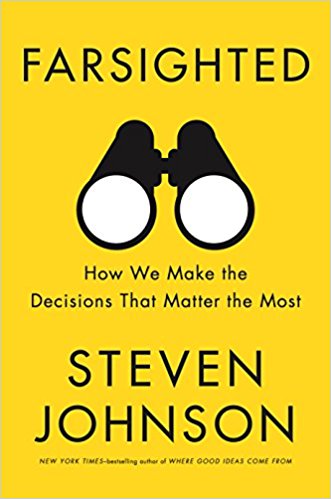You have /5 articles left.
Sign up for a free account or log in.
 Farsighted: How We Make the Decisions That Matter the Most by Steven Johnson
Farsighted: How We Make the Decisions That Matter the Most by Steven Johnson
Published in September of 2018.
Academic decision making is perhaps an oxymoron, but academic decisions must we make.
We make decisions all the time. We sit on search committees to decide whom to hire. We participate in strategic committees to make recommendations on university policies and initiatives. Some of you serve on tenure and promotion committees.
But what if our decision-making processes are flawed?
If we are bad decision makers?
Farsighted is a book about decision science. The science of decision making.
I sort of vaguely knew that there are academics who have devoted themselves to discovering how groups and individuals can make better decisions.
I’ve read Tetlock’s stuff on expert political judgment (another oxymoron) and superforcasters. Black Box Thinking is an excellent book on all of our bad decisions. The Organized Mind helped me think about how I could better organize my mind. Red Teams convinced me of the value of explicitly challenging our assumptions.
Other great books that are at least partly about how bad we are at making decisions include Nudge, Thinking Fast and Slow, Predictably Irrational and The Signal and the Noise. Maybe you can add some others. (Do I hear votes for every book by Chip and Dan Heath?).
Until reading Farsighted, I had not quite put together that all these books are part of a larger disciplinary conversation about decision science. This discipline brings in theories and methods for cognitive science, behavioral economics, sociology, and other scientific threads.
The genius of Steven Johnson is his ability synthesize and weave together a vast amount of scientific findings into a cohesive and surprising narrative.
At this point, I don’t even read the book reviews when a new Steven Johnson book comes out. I just read the book.
Since Farsighted is a popular book about academic research, Johnson synthesizes the literature through storytelling. He tells the story of the bad 19th-century decision to fill in Collect Pond in Lower Manhattan, and the good 2011 decision to send SEAL Team 6 into bin Laden's compound in Abbottabad.
Johnson thinks we are getting better at decision making. We have access to more data. We have better practices to help us make decisions, such as scenario planning, red teaming, and premortems.
Decision science, however, is seldom taught in college. Johnson notes that while the subject may be taught in business schools, the methods and theories of effective decision making are almost never a part of the core undergraduate curriculum.
I’d take Johnson’s critique even further. Would not it make sense to have experts in decision science on our academic committees? Should not we follow the basic principles of good decision making when we are making academic decisions?
One example that Johnson gives of suboptimal decision making are decisions made by non-diverse groups. The more similar a group is to each other, the worse the decisions will end up being. In group discussions, the ideas and knowledge that the group holds in common will tend to surface, while disparate or edge ideas will remain hidden.
How often do we seek out people with different backgrounds and experiences in our academic decision-making processes?
Are you a fan of Steven Johnson?
What decision making books do you recommend?
What are you reading?




